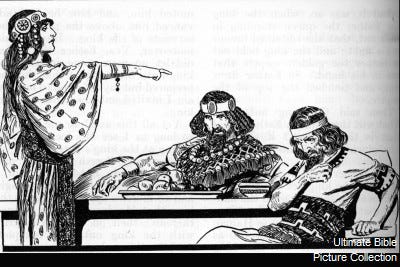The following post is slightly adapted from an article I wrote for sister publications in Vermont, where I live and work when I’m in the United States. Local clergy are asked to submit articles for a “Speaking of Religion” column, and I was happy to oblige. I emailed the article to the newspapers but realized that some of my criticism of anti-Israel protesters was too sarcastic and strident, so I sent a revised version (specifically, toning down language in the 6thparagraph). Even so, the editor in charge of handling submissions demurred; he offered to consider publishing it “eventually” but “for the moment” would only publish it if it were “dialed back a little.” I declined that offer; his response was “to hold off printing it for now.” Which was his prerogative. Judge the implications for yourself. Here’s what I wrote…
Among tightly interwoven threads that form Judaism’s cultural fabric are religion and politics. They’re inseparable parts of our way of life. Jewish religious identity is political in character.
Scripture (Exodus 1-15) tells how Israelite nationhood was founded in a context of revolutionary struggle and upheaval, when God inflicted punishing plagues on Egypt, routed Pharaoh’s army, and liberated Hebrews from enslavement. That episode marked the logical conclusion to and utter collapse of a project of systematic subjugation that had begun with an earlier pharaoh’s failed attempt (one cleverly averted by a conspiracy of brave midwives) to literally liquidate us by rounding up male Hebrew babies and throwing them in the Nile River.
Roughly 1000 years later, according to the Biblical record, another anti-Jewish genocidal scheme took shape, this time with the drama shifting from Egypt to Persia. The book of Esther records how Haman, a Persian politician, plotted an ethnic cleansing campaign to massacre all Jews in that vast empire. Two courageous Jews – Esther and Mordecai – working together foiled Haman’s designs; he along with all who abetted his pogrom were killed instead of their intended, Jewish, victims. The story mentions that our people successfully defended themselves against the aggression and brought malefactors to justice.
Jews across the world solemnize, in the springtime festival of Pesah/Passover, our ancestors’ liberation, through God’s redemptive acts, from captivity in Egypt (where, the Torah tells us, we were held hostage for 400 years); we celebrate, in the late winter festival of Purim, salvation that Jews achieve when they’re prepared to fight for their lives.
Fast forward from ancient Persia to the same place, modern-day Iran, roughly 2500 years later. Its governing regime of brutal Islamists, Haman’s successor villain, openly boasts – in public declarations backing official policy – that it seeks to annihilate the sovereign State of Israel and to that end (at tragic cost of suffering to Palestinians!) has enlisted murderous proxy groups, such as Hamas, Hezbollah, and Houthi terrorists, to do its dirty work.
Aiding - enablers of - this coterie of killers are self-righteous virtue signalers who chant anti-Zionist slogans on street corners and egg on town councils (right here in Vermont) to pass anti-Israel resolutions. Meanwhile, like our Hebrew ancestors in Egypt, Israelis and foreign nationals remain captive in Gaza.
Israel, where nearly half of Jews worldwide live, is in an uproar over its kidnapped citizens and residents held hostage by cruel thugs posing as a liberation army. Jews and our friends everywhere (Muslims and Christians among them!) look on in horror.
However, next week on Purim1 we’ll celebrate as we read the book of Esther, drown out the accursed name of “Haman,” eat, drink, and rejoice in our ability to defeat, over and over, those enemies bent on wiping us out.
Ah, don’t tell me politics has nothing to do with religion! Jewish tradition and current events prove quite to the contrary!
(Esther Accuses Haman before the King / http://bibleencyclopedia.com/picturesjpeg/Esther_Accuses_Haman_1335-298.jpg)
This year Purim starts on Thursday, March 13 at sunset and continues till Shabbat on Friday, March 14; except in Jerusalem and other walled cities, where the festivities continue till Sunday, March 16 at nightfall.



Thank you, Sheri. I can only speculate about the motive behind those newspapers' decision to censor my voice. However, it is certainly censorship. Sad.
Wonderful essay. How long has it been since they censored you? Try again?
Can you submit it as a letter to the editor?
The four corners performance is frustrating and offensive, racist and misguided.
Thank you for submitting it but hopefully you can still get it ou